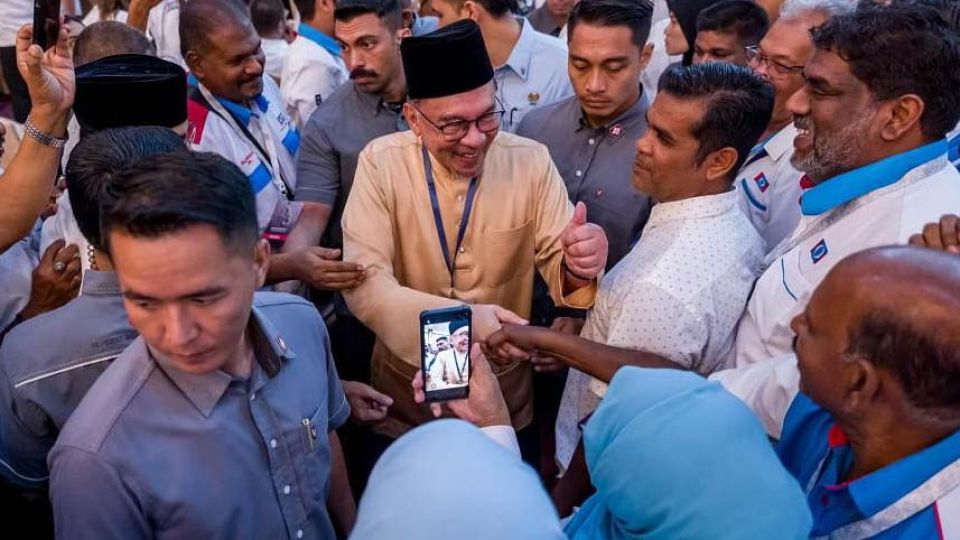April 23, 2024
SHAH ALAM – Malaysian Prime Minister Anwar Ibrahim told his party faithful on April 21 that his government is committed to fighting corruption and carrying out economic reforms, brushing aside criticism that he has compromised his reform agenda.
Speaking at a congress to mark the 25th anniversary of the founding of his People’s Justice Party, or Parti Keadilan Rakyat (PKR), he pledged to continue helping all Malaysians, regardless of race, and said measures taken by his administration, including a plan to roll out targeted fuel subsidies, would save the nation billions of ringgit.
“We subsidise petrol and diesel every day, benefiting everyone, even those with Rolls-Royces… This (targeted fuel subsidies) has been discussed for decades but previous governments dare not do it for fear of becoming unpopular. This government dares to do it to save the nation’s economy,” said Datuk Seri Anwar, to cheers from party delegates.
After taking power in November 2022, Mr Anwar’s administration said it would remove blanket subsidies on fuel, electricity and poultry. In November 2023, it removed chicken subsidies. It has said it will cut petrol subsidies in the second half of 2024.
Mr Anwar said he had saved the country RM1 billion (S$285 million) in 2023 by halting subsidies for the poultry industry. He said targeted fuel subsidies would save billions by preventing foreigners and the wealthy from benefiting.
“I have not compromised. At my age, after having been through so many struggles, now that I have power, would I compromise? No. We may be a bit slow but we want to ensure that we can continue. We will not be hasty,” said the 76-year-old.
Seventeen months into power, PKR is being buffeted by claims that it has failed to fulfil its reform promises and has backtracked on tackling corruption, all of which the Premier denied.
While Mr Anwar has reaffirmed his reformist and anti-corruption agenda, experts said that it will not be an easy road ahead for the Prime Minister and his party.
Mr Anwar came to power by cobbling together support from former rivals Barisan Nasional (BN) and parties from Borneo, after an unprecedented hung Parliament following the 2022 general election.
Although he secured an eventual two-thirds majority in Parliament, Mr Anwar’s reform moves can be hindered by more conservative factions, some analysts say.
Dr Mazlan Ali, senior lecturer at the Razak Faculty of Technology and Informatics at Universiti Teknologi Malaysia, said Mr Anwar might not be able to fully carry out reforms, as he would need his key allies in the unity government, namely BN and the Borneo parties, to agree on them.
“Anwar is a PM from a minority party in a coalition of minority parties. The result is that Mr Anwar and PKR may not be able to implement reforms fully, as they are tied to the other parties,” he added.
The previous Pakatan Harapan government failed, partly because many Malays feared its reform agenda would jeopardise the privileges granted to them under the Constitution.
One analyst said PKR has to find a way to return to the middle ground, after having moved to the right to appease conservative Malay voters, many of whom switched to the opposition Malay-centric Perikatan Nasional in droves at the 2022 election.
Asian studies professor James Chin from the University of Tasmania told The Straits Times: “What Anwar has been doing is moving the party to the right, hoping to catch up with Parti Islam SeMalaysia (PAS) and Umno. He can never outdo PAS and Umno in terms of (Malay supremacy) issues.
“If PKR can commit to a multicultural, multi-religious Malaysia, and that they will hold the fort for the middle path, then Malaysia has a chance. If they just play to the gallery, then I think Malaysia is headed for a bad political future.”
Another issue for PKR: A successor to Mr Anwar.
He will be nearly 80 by the next general election, which is due by 2027. Yet, there were no discussions of a succession plan at the congress, despite analysts saying the party has abundant talent.
“The most obvious one to take over the reins is deputy president Rafizi Ramli,” said Prof Chin, noting however that Mr Rafizi’s recent hospitalisations for a heart attack and a slipped disc may have tarnished his shine.
Instead, Mr Rafizi said the party would start preparing for the next general election two years earlier to ensure Mr Anwar remains premier, and carry out two plans launched at the congress aimed at strengthening the party grassroots and leadership for the election.
“The rolling out of these two frameworks is to ensure that Datuk Seri Anwar Ibrahim remains as prime minister after the next general election,” added Mr Rafizi.


